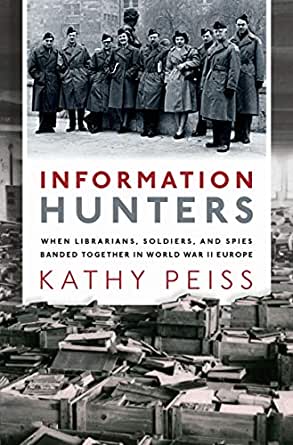Information Hunters
Full Title: Information Hunters: When Librarians, Soldiers, and Spies Banded Together in World War II Europe
Author / Editor: Kathy Peiss
Publisher: Oxford University Press, 2020
Review © Metapsychology Vol. 25, No. 15
Reviewer: Bob Lane
This book tells a story that has not been told before. It tells the story of the many people who saved the documents, books and pictures produced by the Nazis in WWII. As the author tells us in the Prologue “This book grew our of a chance discovery of an online memorial to an uncle I never knew. Reuben Peiss had been a librarian at Harvard when World War II began … and he was recruited into the Office of Strategic Services, the nation’s first intelligence agency.” This reviewer came across the book while doing research on an old professor of mine, Douwe Stuurman. Stuurman is one of the soldiers who contributed to the finding and saving of truckloads of books, documents, pictures, and writings of the time.
Peiss writes: “Stuurman prepared four freight cars of materials for shipment in February 1946, paying out of pocket for labor and hiring a German moving agency, both against regulations. He marveled at their finds – political pamphlets, Jewish literature, Nazi periodicals, newspapers “of all political colorings, illegal and ‘auslandsdeutsche’ newspapers too” recordings of Nazi speeches, millions of newspaper clippings “reflecting the Nazis in the world press” and 50,000 posters.“
“This was an unparalleled relationship between the government, military, and American libraires, one that libraries embraced not only out of patriotic duty but as an opportunity.” As the story unfolds, we learn of the many people (Archibald MacLeish, William Donovan, Herbert Hoover, General Lucius Clay, Hannah Arendt, Lucy Dawidowitz and a number of obscure individuals) who participated in the massive tasks to discover and save the publications that as the war progressed the Nazis were so anxious to destroy or hide. The book is carefully documented and consists of:
Acknowledgements
Prologue
Introduction
- The Country of the Mind Must also Attack
- Librarians and Collectors Go to War
- The Wild Scramble for Documents
- Acquisitions on a Grand Scale
- Fugitive Records of War
- Book Burning – American Style
- Not a Library, but a Large Depot of Loot
Conclusion
Epilogue
Notes (lots and lots of notes)
Index (a very useful and complete index)
Each chapter advances the fascinating story of the massive attempt to discover and save the many documents and books – to determine which were of value (initially to the winning of the war) and then which would be useful in trying the Nazi leaders at the war crimes trials. One of the fascinations of the book is the many old pictures which accompany the story and help to give it a feel of authenticity.
As you can imagine the story includes the many questions that such a project would raise: What about copyright? Who owns these documents and books? How to insure that materials taken from private libraries are accounted for and possibly returned? What to do to be sure that the wartime documents get to the right people? The sheer size of the operation is amazing. Stuurman was responsible for finding and securing boxcar loads of Nazi material in the final years of the war and into the occupation. The problems were exacerbated by the post war division of Berlin and by the ongoing disagreements among wartime “partners” as the cold war progressed.
The book is carefully researched, written with care and skill, and provides an additional warning about the horrors of wartime.
Bob Lane is Professor Emeritus Philosophy at Vancouver Island University and the author of Reading the Bible: Intention, Text, Interpretation.
Categories: General
Keywords: war, information gathering

